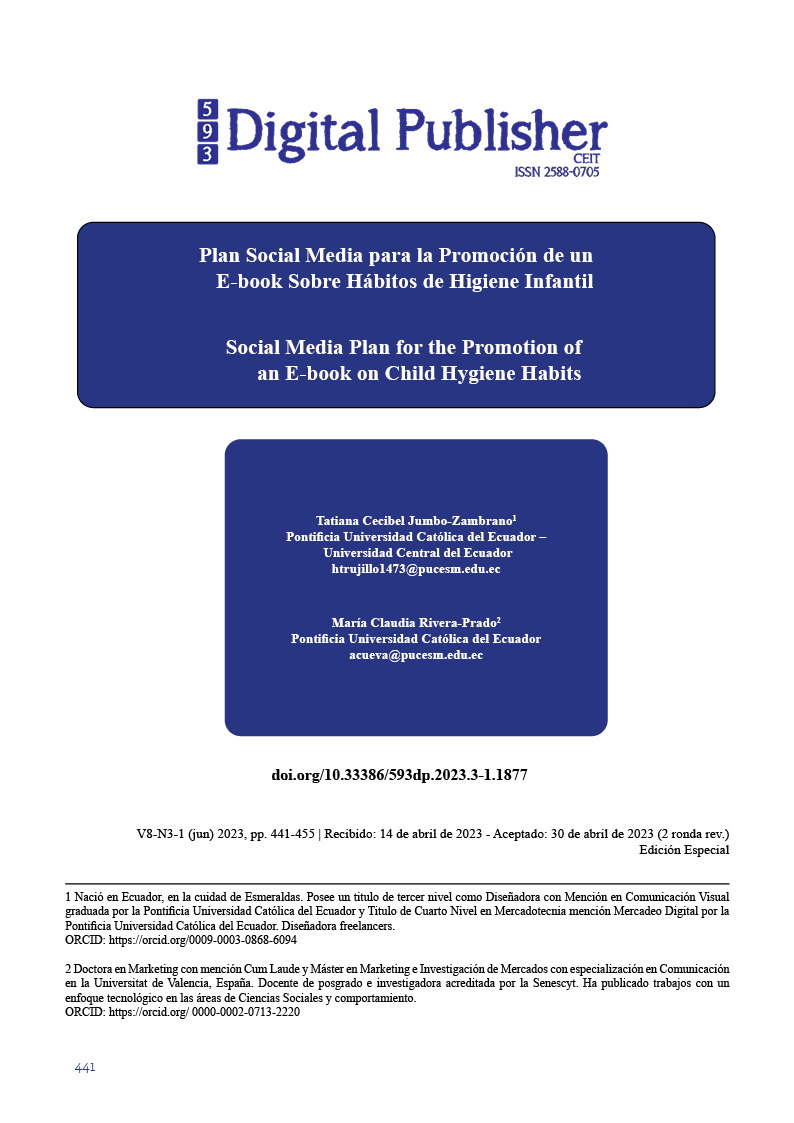Social Media Plan for the promotion of an e-book on child hygiene habits
Main Article Content
Abstract
The Covid-19 pandemic has emphasized the importance of hygiene habits as a preventive measure for diseases especially in childhood. With the digitization of aspects of everyday life, new opportunities arise for the promotion and dissemination of messages through digital marketing strategies and social networks. The aim of this study is to analyze the impact of a social media plan on the promotion of an electronic book (e-book) on child hygiene habits. The essential attributes of a marketing plan are identified through a literature review and validation through the DELPHI method with experts. The most effective social networks to promote child hygiene habits are determined and the most used marketing strategies are analyzed along with specific recommendations for the promotion of e-books and a focus group is carried out to collect opinions about their content. The results expose the appropriate tools to carry out a digital campaign of e-books and provide specific recommendations for the promotion of child hygiene. In conclusion, the publication of a well-designed e-book on child hygiene habits can be an effective tool for parents or caregivers to obtain adequate information and guide children in their personal care in the digital age.
Downloads
Article Details

This work is licensed under a Creative Commons Attribution-NonCommercial-ShareAlike 4.0 International License.
1. Derechos de autor
Las obras que se publican en 593 Digital Publisher CEIT están sujetas a los siguientes términos:
1.1. 593 Digital Publisher CEIT, conserva los derechos patrimoniales (copyright) de las obras publicadas, favorece y permite la reutilización de las mismas bajo la licencia Licencia Creative Commons 4.0 de Reconocimiento-NoComercial-CompartirIgual 4.0, por lo cual se pueden copiar, usar, difundir, transmitir y exponer públicamente, siempre que:
1.1.a. Se cite la autoría y fuente original de su publicación (revista, editorial, URL).
1.1.b. No se usen para fines comerciales u onerosos.
1.1.c. Se mencione la existencia y especificaciones de esta licencia de uso.
References
Aguilar, G., & Jumbo, T. (2021). Diseño de un álbum fotográfico cartoon que fomente los hábitos de higiene en los niños de 1 a 3 años [Tesis de grado, Pontificia Universidad Católica del Ecuador]. ISSUU. https://issuu.com/pucesd/docs/aguilar_gen_sis_-_jumbo_tatiana_3
Astudillo Mamarandi, A. M., & Barriga, S. (2019). La percepción de la experiencia de compras en el comercio electrónico, desde un enfoque teórico práctico. CIENCIAMATRIA, 5(9). https://doi.org/10.35381/cm.v5i9.142
Avendaño, K., Casadiego, A., Salas, F. H., Avendaño, G., & Avendaño, A. (2021). Estrategia para lograr la higiene de manos en niños. Revista Boletín Redipe, 10(5). https://doi.org/10.36260/rbr.v10i5.1308
Borja, F. A. (2021). Prácticas para mejorar los resultados en campañas digitales. Revista Científica En Ciencias Sociales, 3(2). https://doi.org/10.53732/rccsociales/03.02.2021.106:
Canossa, H. (2019). Sistemas de información de marketing en la planificación estratégica de la era digital, Redmarka. Revista de Marketing Aplicado, vol 23, núm. 2, 43-60. https://doi.org/10.17979/redma.2019.23.2.5708
Castillo-Abdul, B. (2020). Comunicación digital: la transformación de la realidad y la conciencia. Comunicación, 42. https://doi.org/10.18566/comunica.n42.a09
Castillo-Abdul, B., Bonilla-del-Río, M., & Núñez-Barriopedro, E. (2021). Influence and Relationship between Branded Content and the Social Media Consumer Interactions of the Luxury Fashion Brand Manolo Blahnik. Publications, 9(1), 10. https://doi.org/10.3390/publications9010010
Centros para el Control y la Prevención de Enfermedades. (2021). Lavado de manos: Las manos limpias salvan vidas. https://www.cdc.gov/handwashing/index.html
Garcia, N., & Brooks, M. (2023). Social media takeover: Using experiential learning to teach social media marketing. Taylor, 2-3. https://doi.org/10.1080/17404622.2022.2049836
Gazca, L. A., Mejía, C. A., & Herrera, J. (2022). Análisis del marketing digital vs marketing tradicional. Un estudio de caso en empresa tecnológica. Cuadernos Latinoamericanos de Administración, 18(35). https://doi.org/10.18270/cuaderlam.v18i35.3773
Gómez-de-Ágreda, Á., Feijóo, C., & Salazar-García, I.-A. (2021). Una nueva taxonomía del uso de la imagen en la conformación interesada del relato digital. Deep fakes e inteligencia artificial. El Profesional de La Información. https://doi.org/10.3145/epi.2021.mar.16
Hansen, J., Schäfer, I., & Zschorlich, B. (2021). Uso del método Delphi para identificar intervenciones para la prevención y manejo de enfermedades crónicas. Políticas y sistemas de investigación en salud, 19(1), 1-13.
Hernández, R., Fernández, C., & Baptista, M. (2010). Metodología de la investigación. McGraw Hill.
Houston, B. (2016). Social media and disasters: a functional framework for social media use in disaster planning, response, and research. Disasters, 9. https://doi.org/10.1111/disa.12092
INEC (2017). Millenials en cifras. Retrieved from https://www.ecuadorencifras.gob.ec/documentos/web-inec/Inforgrafias-INEC/2017/millenials.pdf
Karakoç, B. (2021). Digital Reading and the Concept of Ebook: Metaphorical Analysis of Preservice Teachers’ Perceptions Regarding the Concept of Ebook. SAGE Open, 11(2). https://doi.org/10.1177/21582440211016841
Kim, AJ, & Ko, E. (2021). El impacto de la voz de la marca y la consistencia del contenido en el compromiso de los consumidores con la marca y la intención de compra en las redes sociales. Revista de Investigación Empresarial, 134, 117-131. https://doi.org/10.1016/j.jbusres.2021.01.022
Kim, K. H., & Kim, E. Y. (2020). Fashion marketing trends in social media and sustainability in fashion management. Journal of Business Research, 117, 508–509. https://doi.org/10.1016/j.jbusres.2020.06.001
Kotler, P., Kartajaya, H. y Setiawan, I. (2017). Marketing 4.0: Pasando de lo tradicional a lo digital. John Wiley & Sons. https://ideas.repec.org/h/wsi/wschap/9789813275478_0004.html
Lema Caisaguano, N. A., Pinango Chasiluisa, B. D., Vargas Lema , L. E., & Zurita Riera , E. P. (2022). Desarrollo de los hábitos de higiene en el sub nivel de preparatoria. INNDEV - Innovation &Amp; Development Ciencias Del Sur, 1(2), 13–30. Recuperado a partir de https://www.itscs-cicc.com/ojs/index.php/inndev/article/view/38
López-Luengo, M. A., González Díaz, E., Paños, E., & Reyes Ruiz-Gallardo, J. (2021). Microorganismos y hábitos de higiene. ¿Se aprende más en la Educación Infantil mediante fichas? Revista Eureka Sobre Enseñanza y Divulgación de Las Ciencias, 18(2). https://doi.org/10.25267/rev_eureka_ensen_divulg_cienc.2021.v18.i2.2302
Marcos, J. C., & Parras, A. (2021). Claves para captar la atención en la producción publicitaria a través de archivos, bancos de imágenes y librerías musicales en tiempos del Covid19. Revista General de Información y Documentación, 31(1). https://doi.org/10.5209/rgid.76949
Mendoza, C. G., Pinillos, L. K., & Macarachvili, A. (2021). Inbound marketing as a strategic approach in the context of technological start-ups aimed at businesses. Universidad y Sociedad, 13(5).
Morgan, AJ, Ross, A., Reavley, N., & Jorm, AF (2020). Investigando las experiencias y perspectivas de adultos jóvenes con problemas de salud mental utilizando servicios de salud mental en línea: estudio de grupo focal. JMIR Salud Mental, 7(1), e15520.
Pakura, S. (2023). How entrepreneurs build brands and reputation with social media PR: empirical insights from start-ups in Germany. Journal of Small Business & Entrepreneurship, 8. https://doi.org/10.1080/08276331.2020.1728490
Perdigón Llanes, Rudibel, & Pérez Pino, María Teresa. (2022). Open source tools for statistical analysis in scientific research. Anales de la Academia de Ciencias de Cuba, 12(3), e1120. Epub 01 de noviembre de 2022. Recuperado en 12 de abril de 2023, de http://scielo.sld.cu/scielo.php?script=sci_arttext&pid=S2304-01062022000300022&lng=es&tlng=en.
Pereira, V., & Y Sobral, D. (2021). El impacto de Covid-19 en las redes sociales: un estudio exploratorio sobre las estrategias y prácticas de las marcas portuguesas. Revista de comunicaciones de marketing, 27(2), 206-226.
Pérez, J. C. (2018). La Historia y Evolución del Marketing; Hacia un Marketing Digital Influyente Para Las Organizaciones en el Siglo XXI. Fundación Universitaria de Popayán: http://unividafup.edu.co/repositorio/files/original/1fe9c271022b9d14317bc8c41740d1d6.pdf
Santillán Aguirre, J. P., Cadena Vaca, V. del C., & Cadena Vaca, M. (2019). Educación Steam: entrada a la sociedad del conocimiento. Ciencia Digital, 3(3.4.), 212-227. https://doi.org/10.33262/cienciadigital.v3i3.4.847
Sekayi, D., & Kennedy, A. (2017). Qualitative Delphi Method: A Four Round Process with a Worked Example. The Qualitative Report, 22(10), 2755-2763. https://doi.org/10.46743/2160-3715/2017.2974
Ramos, J. (2020). El plan de Social Media Marketing para empresas. Publishing.
Raynaudo, G., & Peralta, O. (2022). Las imágenes digitales como objetos simbólicos: Un análisis sobre su impacto en el aprendizaje infantil. Revista Infancia, Educación y Aprendizaje, 8(1), 93–104. https://doi.org/10.22370/ieya.2022.8.1.2885
Rodríguez, G. A. R., Santos, F. de A., Muriel, E. G. R., & Guzmán, J. J. C. (2021). Factores influyentes en el diseño de una campaña de marketing digital para una marca de maquillaje. Revista Fatec Zona Sul, 7(6), 18–36. https://doi.org/10.26853/Refas_ISSN-2359-182X_v07n06_07



